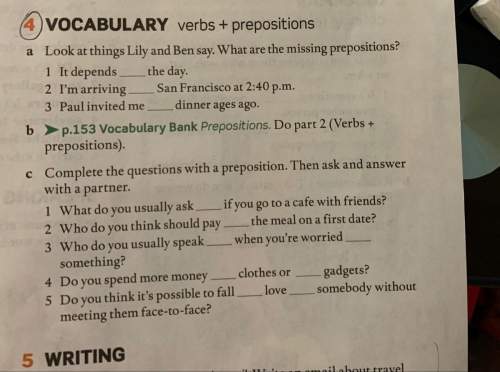
English, 22.07.2019 20:30 kaitlyn2030
Can someone me, ? ? in the paragraph below, the author uses verbal irony, suggesting something different from what is literally meant. in this paragraph, what is crane suggesting about the timing of shipwrecks? explain. shipwrecks are apropos of nothing. if men could only train for them and have them occur when the men had reached pink condition, there would be less drowning at sea. of the four in the dinghy none had slept any time worth mentioning for two days and two nights previous to embarking in the dinghy, and in the excitement of clambering about the deck of a foundering11 ship they hadalso forgotten to eat heartily.

Answers: 1


Another question on English

English, 22.06.2019 08:10
Rev. simon hosack] entered fully into the feeling of suffering and sorrow which took possession of me when i discovered that a girl weighed less in the scale of being than a boy, and he praised my determination to prove the contrary. which best describes society’s view of boys’ and girls’ abilities during the period in which elizabeth cady stanton lived?
Answers: 3

English, 22.06.2019 10:40
Sylvia stone (my myfwa story girl) should i change anything about it?
Answers: 2

English, 22.06.2019 13:00
Which academic skill allows people to explore new concepts? a. writing b. reading c. time management d. math
Answers: 1

English, 22.06.2019 15:00
Select the correct text in the passage. which part of this excerpt from homer's odyssey uses an epic simile? the king himself the vases ranged with care; then bade his followers to the feast prepare. a victim ox beneath the sacred hand of great alcinous falls, and stains the sand. to jove the eternal (power above all powers! who wings the winds, and darkens heaven with showers) the flames ascend: till evening they prolong the rites, more sacred made by heavenly song; for in the midst, with public honours graced, thy lyre divine, demodocus! was placed. all, but ulysses, heard with fix'd delight; he sate, and eyed the sun, and wish’d the night; slow seem’d the sun to move, the hours to roll, his native home deep-imaged in his soul. as the tired ploughman, spent with stubborn toil, whose oxen long have torn the furrow'd soil, sees with delight the sun's declining ray, when home with feeble knees he bends his way to late repast (the day's hard labour done); so to ulysses welcome set the sun; then instant to alcinous and the rest (the scherian states) he turn’d, and thus address'd: "o thou, the first in merit and command! and you the peers and princes of the land! may every joy be yours! nor this the least, when due libation shall have crown'd the feast,
Answers: 1
You know the right answer?
Can someone me, ? ? in the paragraph below, the author uses verbal irony, suggesting something...
Questions

Arts, 07.10.2019 02:00



English, 07.10.2019 02:00

Social Studies, 07.10.2019 02:00

History, 07.10.2019 02:00






History, 07.10.2019 02:00

English, 07.10.2019 02:00


English, 07.10.2019 02:00

English, 07.10.2019 02:00







